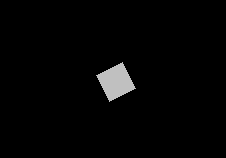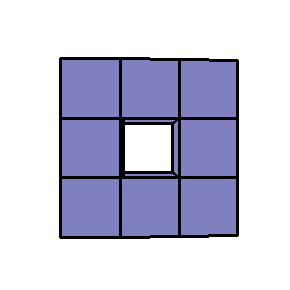Pygame rotating cubes around axis
I have been playing around with the example of a rotating cube here. I have generated 2 cubes that should rotate around the Y-axis. However, it doesn't seem to work as expected and I can't figure out what the problem of it is.
Here is a working code example:
import sys
import math
import pygame
from pygame.math import Vector3
from enum import Enum
class Color(Enum):
BLACK = (0, 0, 0)
SILVER = (192,192,192)
class Cube():
def __init__(self, vectors, screen_width, screen_height, initial_angle=25):
self._vectors = vectors
self._angle = initial_angle
self._screen_width = screen_width
self._screen_height = screen_height
# Define the vectors that compose each of the 6 faces
self._faces = [(0,1,2,3),
(1,5,6,2),
(5,4,7,6),
(4,0,3,7),
(0,4,5,1),
(3,2,6,7)]
self._setup_initial_positions(initial_angle)
def _setup_initial_positions(self, angle):
tmp = []
for vector in self._vectors:
rotated_vector = vector.rotate_x(angle).rotate_y(angle)#.rotateZ(self.angle)
tmp.append(rotated_vector)
self._vectors = tmp
def transform_vectors(self, new_angle):
# It will hold transformed vectors.
transformed_vectors = []
for vector in self._vectors:
# Rotate the point around X axis, then around Y axis, and finally around Z axis.
mod_vector = vector.rotate_y(new_angle)
# Transform the point from 3D to 2D
mod_vector = self._project(mod_vector, self._screen_width, self._screen_height, 256, 4)
# Put the point in the list of transformed vectors
transformed_vectors.append(mod_vector)
return transformed_vectors
def _project(self, vector, win_width, win_height, fov, viewer_distance):
factor = fov / (viewer_distance + vector.z)
x = vector.x * factor + win_width / 2
y = -vector.y * factor + win_height / 2
return Vector3(x, y, vector.z)
def calculate_average_z(self, vectors):
avg_z = []
for i, face in enumerate(self._faces):
# for each point of a face calculate the average z value
z = (vectors[face[0]].z +
vectors[face[1]].z +
vectors[face[2]].z +
vectors[face[3]].z) / 4.0
avg_z.append([i, z])
return avg_z
def get_face(self, index):
return self._faces[index]
def create_polygon(self, face, transformed_vectors):
return [(transformed_vectors[face[0]].x, transformed_vectors[face[0]].y),
(transformed_vectors[face[1]].x, transformed_vectors[face[1]].y),
(transformed_vectors[face[2]].x, transformed_vectors[face[2]].y),
(transformed_vectors[face[3]].x, transformed_vectors[face[3]].y),
(transformed_vectors[face[0]].x, transformed_vectors[face[0]].y)]
class Simulation:
def __init__(self, win_width=640, win_height=480):
pygame.init()
self.screen = pygame.display.set_mode((win_width, win_height))
self.clock = pygame.time.Clock()
cube = Cube([
Vector3(0, 0.5, -0.5),
Vector3(0.5, 0.5, -0.5),
Vector3(0.5, 0, -0.5),
Vector3(0, 0, -0.5),
Vector3(0, 0.5, 0),
Vector3(0.5, 0.5, 0),
Vector3(0.5, 0, 0),
Vector3(0, 0, 0)
], win_width, win_height)
cube2 = Cube([
Vector3(0.5, 0.5, -0.5),
Vector3(1, 0.5, -0.5),
Vector3(1, 0, -0.5),
Vector3(0.5, 0, -0.5),
Vector3(0.5, 0.5, 0),
Vector3(1, 0.5, 0),
Vector3(1, 0, 0),
Vector3(0.5, 0, 0)
], win_width, win_height)
self._angle = 30
self._cubes = [cube, cube2]
def run(self):
while True:
for event in pygame.event.get():
if event.type == pygame.QUIT:
pygame.quit()
sys.exit()
self.clock.tick(50)
self.screen.fill(Color.BLACK.value)
for cube in self._cubes:
transformed_vectors = cube.transform_vectors(self._angle)
avg_z = cube.calculate_average_z(transformed_vectors)
# Draw the faces using the Painter's algorithm:
# Distant faces are drawn before the closer ones.
for avg_z in sorted(avg_z, key=lambda x: x[1], reverse=True):
face_index = avg_z[0]
face = cube._faces[face_index]
pointlist = cube.create_polygon(face, transformed_vectors)
pygame.draw.polygon(self.screen, Color.SILVER.value,pointlist)
pygame.draw.polygon(self.screen, Color.BLACK.value, pointlist, 3)
# break
self._angle += 1
pygame.display.flip()
if __name__ == "__main__":
Simulation().run()
Both cubes should rotate around the Y-axis in this example. For the future I'd like to have a solution so they can rotate around any axis.
Solution 1:
It is not sufficient to sort the faces of each cube separately by its depth. You've to sort the faces of all objects of the entire scene by its depth.
Create a list of tuples, which consists of the projected (transformed) points ofa face and the average depth (z value):
polygons = []
for cube in self._cubes:
transformed_vectors = cube.transform_vectors(self._angle)
avg_z = cube.calculate_average_z(transformed_vectors)
for z in avg_z:
face_index = z[0]
face = cube._faces[face_index]
pointlist = cube.create_polygon(face, transformed_vectors)
polygons.append((pointlist, z[1]))
Draw the faces of all objects in (reverse) sorted order:
for poly in sorted(polygons, key=lambda x: x[1], reverse=True):
pygame.draw.polygon(self.screen, Color.SILVER.value,poly[0])
pygame.draw.polygon(self.screen, Color.BLACK.value, poly[0], 3)

Minimal example:  repl.it/@Rabbid76/PyGame-3D
repl.it/@Rabbid76/PyGame-3D

import math
import pygame
def project(vector, w, h, fov, distance):
factor = math.atan(fov / 2 * math.pi / 180) / (distance + vector.z)
x = vector.x * factor * w + w / 2
y = -vector.y * factor * w + h / 2
return pygame.math.Vector3(x, y, vector.z)
def rotate_vertices(vertices, angle, axis):
return [v.rotate(angle, axis) for v in vertices]
def scale_vertices(vertices, s):
return [pygame.math.Vector3(v[0]*s[0], v[1]*s[1], v[2]*s[2]) for v in vertices]
def translate_vertices(vertices, t):
return [v + pygame.math.Vector3(t) for v in vertices]
def project_vertices(vertices, w, h, fov, distance):
return [project(v, w, h, fov, distance) for v in vertices]
class Mesh():
def __init__(self, vertices, faces):
self.__vertices = [pygame.math.Vector3(v) for v in vertices]
self.__faces = faces
def rotate(self, angle, axis):
self.__vertices = rotate_vertices(self.__vertices, angle, axis)
def scale(self, s):
self.__vertices = scale_vertices(self.__vertices, s)
def translate(self, t):
self.__vertices = translate_vertices(self.__vertices, t)
def calculate_average_z(self, vertices):
return [(i, sum([vertices[j].z for j in f]) / len(f)) for i, f in enumerate(self.__faces)]
def get_face(self, index):
return self.__faces[index]
def get_vertices(self):
return self.__vertices
def create_polygon(self, face, vertices):
return [(vertices[i].x, vertices[i].y) for i in [*face, face[0]]]
class Scene:
def __init__(self, mehses, fov, distance):
self.meshes = mehses
self.fov = fov
self.distance = distance
self.euler_angles = [0, 0, 0]
def transform_vertices(self, vertices, width, height):
transformed_vertices = vertices
axis_list = [(1, 0, 0), (0, 1, 0), (0, 0, 1)]
for angle, axis in reversed(list(zip(list(self.euler_angles), axis_list))):
transformed_vertices = rotate_vertices(transformed_vertices, angle, axis)
transformed_vertices = project_vertices(transformed_vertices, width, height, self.fov, self.distance)
return transformed_vertices
def draw(self, surface):
polygons = []
for mesh in self.meshes:
transformed_vertices = self.transform_vertices(mesh.get_vertices(), *surface.get_size())
avg_z = mesh.calculate_average_z(transformed_vertices)
for z in avg_z:
#for z in sorted(avg_z, key=lambda x: x[1], reverse=True):
pointlist = mesh.create_polygon(mesh.get_face(z[0]), transformed_vertices)
polygons.append((pointlist, z[1]))
#pygame.draw.polygon(surface, (128, 128, 192), pointlist)
#pygame.draw.polygon(surface, (0, 0, 0), pointlist, 3)
for poly in sorted(polygons, key=lambda x: x[1], reverse=True):
pygame.draw.polygon(surface, (128, 128, 192), poly[0])
pygame.draw.polygon(surface, (0, 0, 0), poly[0], 3)
vertices = [(-1,-1,1), (1,-1,1), (1,1,1), (-1,1,1), (-1,-1,-1), (1,-1,-1), (1,1,-1), (-1,1,-1)]
faces = [(0,1,2,3), (1,5,6,2), (5,4,7,6), (4,0,3,7), (3,2,6,7), (1,0,4,5)]
cube_origins = [(-1, -1, 0), (0, -1, 0), (1, -1, 0), (1, 0, 0), (1, 1, 0), (0, 1, 0), (-1, 1, 0), (-1, 0, 0)]
meshes = []
for origin in cube_origins:
cube = Mesh(vertices, faces)
cube.scale((0.5, 0.5, 0.5))
cube.translate(origin)
meshes.append(cube)
scene = Scene(meshes, 90, 5)
pygame.init()
window = pygame.display.set_mode((400, 300))
clock = pygame.time.Clock()
run = True
while run:
clock.tick(60)
for event in pygame.event.get():
if event.type == pygame.QUIT:
run = False
window.fill((255, 255, 255))
scene.draw(window)
scene.euler_angles[1] += 1
pygame.display.flip()
pygame.quit()